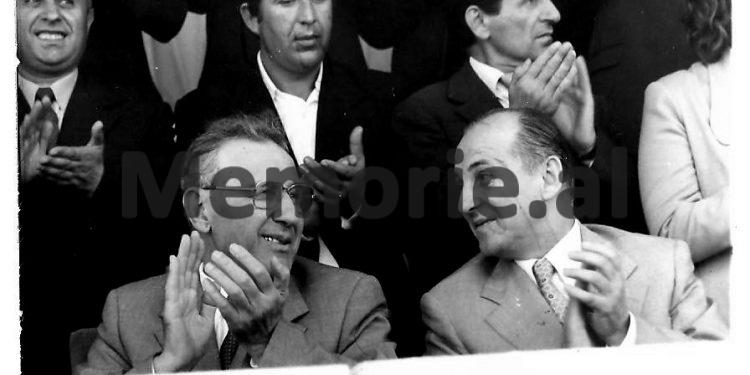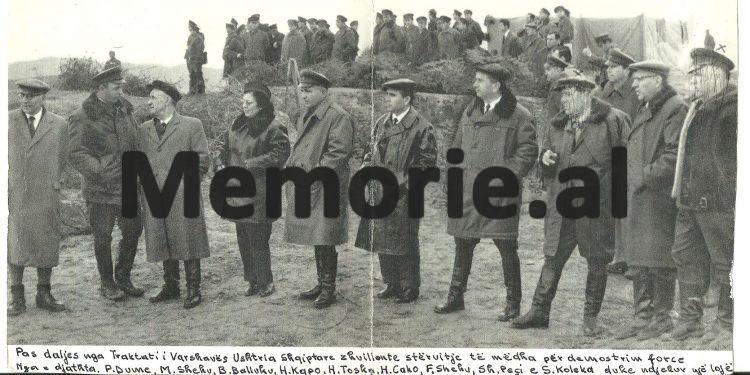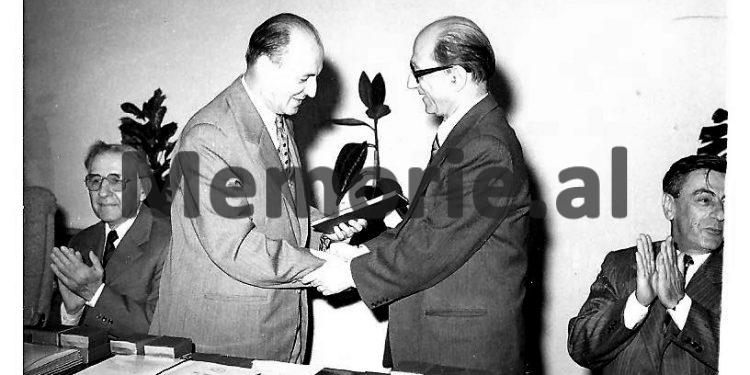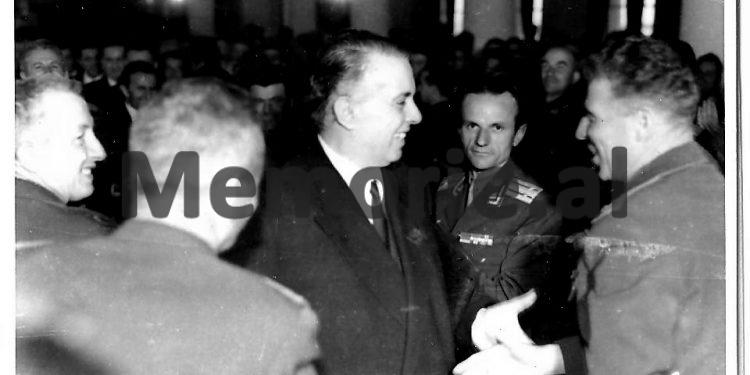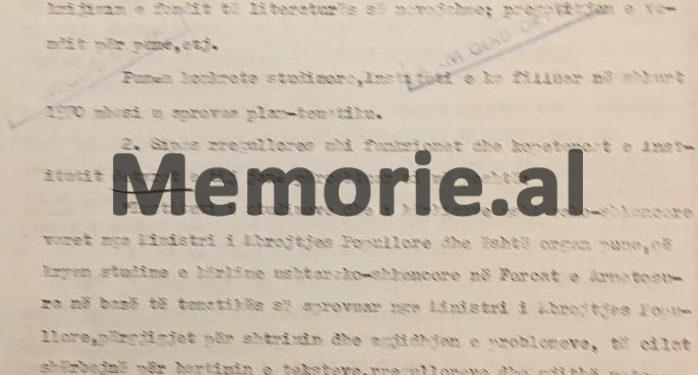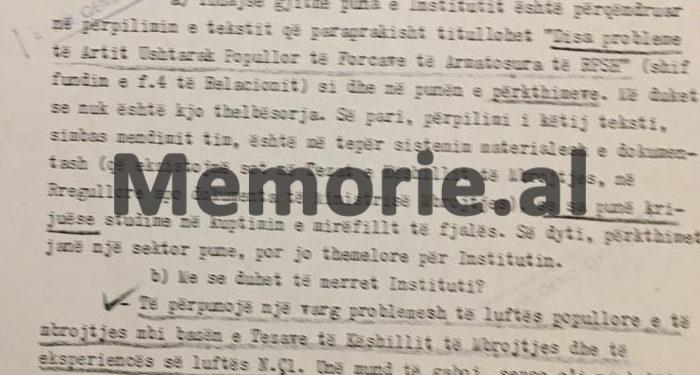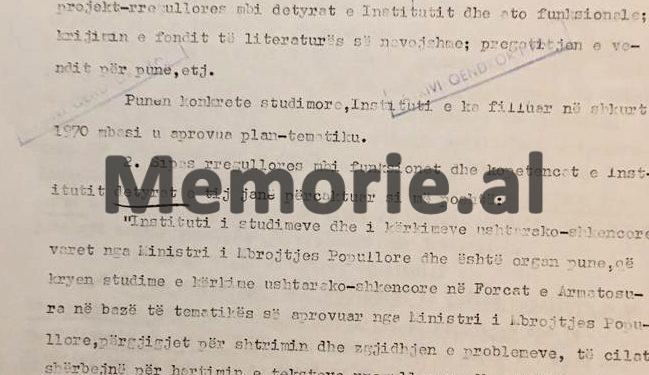Dashnor Kaloçi
Memorie.al publishes an archival document extracted from the Archive of the Armed Forces at the Ministry of Defense which belongs to 1972 and is a letter from Ramiz Alia, former secretary of the Central Committee of the ALP (covering propaganda, art and culture), sent to the Prime Minister, Mehmet Shehu, regarding some problems of its work and well-being at the Institute of Military Studies and Scientific Research at the Ministry of Defense. Although at the end of that letter, Ramiz Alia states that he has no knowledge of military problems, he has analyzed the work done there, mentioning some of its well-known military cadres, such as Spiro Shalesi, Enver Begeja, Rasim Bazo, etc., who had graduated from the military academies of Italy and the Soviet Union and were considered the “brain” of the Albanian Army.
“Scientific research work cannot begin after the age of 50. Especially when up to this age the cadre has not been engaged in such work at all. Spiro Shalesi or Esat Golemi cannot work (for health reasons) even 1-2 hours a day. Enver Begeja has not been engaged in research work at all all his life, etc. I think that the Institute should be gradually given to capable people, with military-political culture, old and young. Having data and inclination for study work. These are some of my thoughts on the work and duties of the Institute of Military Studies. “I can be wrong, I emphasize this, because only military art, as well as the concrete problems of the army, I do not know.” This is stated, among other things, at the end of a letter that the former secretary of the Central Committee of the ALP, Ramiz Alia, sent to Mehmet Shehu in February 1972, where he informed the Prime Minister about the poor work done in Institute of Military Studies. In that document which was recently extracted from the Archive of the Armed Forces of the Ministry of Defense, the main thing that stands out is that: with the control of the work that was done in the Institute of Military Scientific Studies and Research, it was charged to Ramiz Alia was also appointed, who was the secretary of the Central Committee of the ALP, from the beginning of the ’50s when he was elected to that high party function, until 1985, when he replaced Enver Hoxha at the head. of the ALP, was it only concerned with the problems of propaganda, art and culture?! But in fact, that letter written by Ramiz Alia, is a response to the letter sent to him, Prime Minister Mehmet Shehu, who was considered one of the best experts on military issues in the ranks of senior leadership, where in addition to commanded the First Assault Brigade during the War, he had studied briefly at a Military College in Naples, Italy in the mid-1930s, and after the end of the War, had completed a specialization at the Military Academy “Frunxe” in Moscow, which he failed to complete, as he returned urgently to Albania in 1947, after Enver had appointed him Chief of Staff of the Albanian Army, after dismissing from that position, Major General Spiro Moisiu, a former military man. career. Unlike Mehmet Shehu, although Ramiz Alia had no knowledge of military problems at all (which he himself stated at the end of this letter, which we are publishing in full in this article), he was forced to deal with problems there. technical of a military character, as if he were an old career soldier, as was often the case in the senior leadership of that time throughout the period of the communist regime?!
Ramiz Alia’s letter to Prime Minister Mehmet Shehu
Comrade Mehmet
I read the material sent to you by the Political Directorate. Even from this material, it seems to me, it turns out that the disturbance we had for the work of this Institute is not without grounds.
- It seems to me that the Ministry of Defense itself does not assess the need and the role that this Institute should play. One indicator is what frames are given. I am not talking about the fact that people with reports or limited work skills are sent. This does not constitute a major evil. But it expresses a consideration for the work and role of the Institute if it is seen as a place of accommodation for staff who on the one hand are ill and incapable of active service and on the other hand have no data or inclination for study work.
More specifically: Scientific research work cannot be started after the age of 50.
Especially when up to this age the cadre has not been engaged in such work at all. Spiro Shalesi or Esat Golemi cannot work (for health reasons) even 1-2 hours a day. Enver Begeja has not been engaged in research work at all all his life, etc. I think that the Institute should be gradually given to capable people, with military-political culture, old and young. Having data and inclination for study work.
- The Institute should be charged by the Ministry for studies and not be considered as a supplementary and operational apparatus of the Political Directorate or the General Staff. Today, as far as I know, the friends of the Institute are often in charge of conducting inspections, assisting as Ministry envoys in training or military games, etc. Or the Institute becomes an organization for the propagation of various politico-military theses, which is the task of the Political Directorate or the General Staff, but not of the Institute. They can say that this serves the Institute to connect bodies with practice. Undoubtedly, the Institute should be related to the practice, but not formally, but effectively and in relation to the studies it conducts and which derive from the approved study plan.
- Regarding the study work plan:
- Almost all the work of the Institute is focused on the compilation of the text previously entitled “Some problems of the Folk Martial Art of the Armed Forces of the Republic of Albania” (See the end of page 4 of the report) as well as the work of translations.
It seems to me that this is not the essential.
First, the compilation of this text in my opinion is more a systematization of materials and documents (existing today in the Theses of the Defense Council, in the Regulations or documents of the Ministry of Defense) than creative work studies in the true sense of the word.
Second, translations are a working sector, but not essential for the Institute.
- b) What should the Institute deal with?
Elaborate a series of defense problems on the basis of Defense Council Theses and Nc-Çl war experience. I can be wrong because I do not know this issue, but I have to talk about the Albanian military art (not megalomania, nor nationalism) but about the martial art adapted and related to the experience and economic, political, ideological conditions of the country ours.
The theses of the Defense Council seem to me very important and very significant in this regard. In order to do this work, the Institute must be guided by the collegium of the Ministry of Defense, by the problems that arise to it. The theses of the Defense Council, the work for their implementation in the games that are organized and the experience that emerges from these, seem to me to raise many problems that need further study and deepening.
To start from the study of the experience of the N.Çl. War, not for history, but in order to draw scientific conclusions and lessons for today (Today this work is entrusted only to Rasim Bazos. Can you do it?) To know the concepts revisionist and bourgeois on defense and scientifically argue criticism of them. To study the concepts of the enemies on the anti-guerrilla war (how many American sabotages there are for this) not only to draw the necessary conclusions, but also to see this issue in the current conditions of the development of the interconnection combat technique, etc.
For information: We have received some German documents of the war which speak about our war N.Çl. and German command operations in Albania (we have not yet translated them).
As my friends tell me, there is useful material. It is interesting to study the tactics of the enemy, the maneuvering of anti-guerrilla forces, because here you not only get acquainted with the methods of the enemy, but also see the technical-strategic ability of the N.Çl. in special actions, also confronting the tactical-operational plan of the enemy.
These are some of my thoughts on the work and duties of the Institute of Military Studies. I can be wrong, I emphasize this, because only the martial art, as well as the concrete problems of the army, I do not know.
Hello
Ramiz Alia
- II. 1972
P.S. I apologize for being too late for the answer, but I was in Shkodra and Korça exactly this month.
In 1974 most of the staff of the Institute were imprisoned
The letter that the secretary of the Central Committee of the ALP, Ramiz Alia, had sent to the address of the Prime Minister Mehmet Shehu, where he informed him about the poor work done in the Institute of Military Studies belongs to 1972, when Enver Hoxha has not yet had launched a crackdown on senior Defense Ministry servicemen led by Beqir Balluku, Petrit Dumes and Hito Cakos, whom he labeled “the head of a coup group in the army” two years later. While not more than two years had passed since that letter of Ramiz Alia, the wave of blow that Enver Hoxha issued to the Albanian Army affected a number of senior cadres and key leaders who had served over the years or served at the Institute of Studies and Research Military and Scientific. Among the main soldiers who were struck by Enver Hoxha’s paranoia and who had served at that institute, were: Ernest Jakova, (former Major General) Sadik Bekteshi, (Lieutenant General, “People’s Hero”) Dilaver Radeshi, (Colonel ) Spiro Shalesi, (Major General) Elami Hado, (Colonel) Abaz Fejzo, (Colonel-General, “People’s Hero”) Vaskë Gjino, (Colonel-General), etc., who were interned, imprisoned or died in prisons and labor camps. One of the main accusations leveled against the military of the Institute of Military Studies was that of translating foreign military literature. This accusation was completely absurd, as at that time in Martial Arts it was emphasized: “To fight the enemy, you must first know him.” After the elimination of these main soldiers who constituted the brain of the Albanian Army, most of whom had graduated with excellent results in the military academies of the former Soviet Union, other cadres were appointed to the Institute of Military Studies, completely incompetent. , some of whom had just been drafted into the army, being taken over by the working class / Memorie.al




